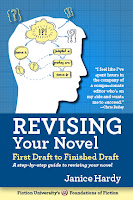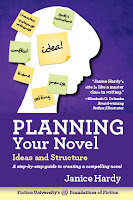Getting stuck happens to everyone, and there are plenty of ways to get stuck. The full on “ack, I can’t write a sentence” block, the “not sure where to go next” conundrum, the “I can’t figure out how to make this work” frustration. Some novels charge out of the gate like they’re on fire. Others make you fight them every word of the way. Then you have the ones that chug along great and then…stall.
I recently dealt with one of those, especially in the third act. I knew what needed to happen, I had an outline, had everything I should have needed to finish the last nine chapters of the dang book.
But they didn’t want to write.
I finally realized it was because I knew what had to happen, but my characters weren’t feeling it. They didn’t have solid goals and motivation to get them where I needed them to go. They were going because I told them to, not because they wanted to. So the story stalled.
That was key. The story stalled.
The plot was right there, chugging along just as I planned it to do. But it was hard to write because the scenes felt flat, lifeless, boring. I knew they weren’t, the plot was good, but for some reason my characters no longer cared what they were doing. My instincts knew something was off, which is why I had trouble moving forward, even though I knew what was supposed to happen.
Sound familiar to anyone?
For me, this is one of the more frustrating getting stuck issues. To know what I should be writing and just flat out not have it work. Because I usually don’t stop writing right away when this happens. I keep working, seeing the story get more and more bleh until I finally put on the brakes and try to figure out where it went wrong.
If you’re facing a stalled scene or story, ask yourself:
1. Are there plausible and strong motivations for your protag to be doing what the plot requires them to?
If not, the characters aren’t driving the plot, the plot is driving them. Look for ways to motivate your characters again. This might require going back a bit, but somewhere you probably have lost the reason they’re on this story path in the first place. At some point, solving the plot problem stopped being the most important thing in their lives. More than likely it’s because…
2. Did your stakes decrease or disappear?
When characters stop caring it’s usually because there’s no longer anything at stake if they fail. Maybe the big bad is still out there, but there’s nothing at risk for them RIGHT NOW. They feel safe, even if they’re still technically in trouble or on the run. Try looking for ways to put them back at risk. But beware—you don’t want to just throw danger at them. That’s just as boring because the danger doesn’t really matter. Look for things where failure matters to their character, character arc, or the plot. It might be time to rekindle the…
3. Conflict. Did you lose it?
If your characters are just going through the steps to get them from point A to point B, and nothing is really in their way (as in, something actually working to prevent them from obtaining what they want) the scene can feel lifeless and stall. Try looking at how you can add conflict back into your story. Look at the internal and external goals and issues. How might you knock those two together again so they’re at odds with one another? Maybe you could have your characters disagree over what needs to be done, or have the only way to succeed require a sacrifice the protag isn’t willing to make. Find ways to make the protag face a tough choice instead of just a tough situation everyone knows they’ll get through.
4. Has a subplot taken over?
Sometimes a subplot becomes more interesting and steals the show, leading your protag off on a wild tangent. Then you reach a point where you don’t know what to do or where to go, but you can’t figure out how to get back on track. Look for where you left the plot highway. It might be a plot event that sent you in a new direction, of you might have changed the goal or motivation of your protag. Did they suddenly change their minds about what they wanted or why they wanted it? Sometimes a great subplot idea can push aside the core conflict and you find your protag shifted goals with no strong cause.
A stalled story almost always ends up being a narrative drive issue in some way. Drive is all about wanting something, so figure out what your character wants, what you’re doing to keep them from it, and what will happen if they fail, and you’ll start to see life in your story again.
Have you ever stalled a story? Did you get it going again? When did your stall happen?
 Looking for tips on revising your novel? Check out my book Revising Your Novel: First Draft to Finished Draft,
a series of self-guided workshops that help you revise your manuscript
into a finished novel. Still working on your idea? Then try my
just-released Planning Your Novel Workbook.
Looking for tips on revising your novel? Check out my book Revising Your Novel: First Draft to Finished Draft,
a series of self-guided workshops that help you revise your manuscript
into a finished novel. Still working on your idea? Then try my
just-released Planning Your Novel Workbook.  A
long-time fantasy reader, Janice Hardy always wondered about the
darker side of healing. For her fantasy trilogy The Healing Wars, she
tapped into her own dark side to create a world where healing was
dangerous, and those with the best intentions often made the worst
choices. Her novels include The Shifter, Blue Fire, and Darkfall from Balzer+Bray/Harper Collins. The Shifter,
was chosen for the 2014 list of "Ten Books All Young Georgians Should
Read" from the Georgia Center for the Book. It was also shortlisted for
the Waterstones Children's Book Prize, and The Truman Award in 2011.
A
long-time fantasy reader, Janice Hardy always wondered about the
darker side of healing. For her fantasy trilogy The Healing Wars, she
tapped into her own dark side to create a world where healing was
dangerous, and those with the best intentions often made the worst
choices. Her novels include The Shifter, Blue Fire, and Darkfall from Balzer+Bray/Harper Collins. The Shifter,
was chosen for the 2014 list of "Ten Books All Young Georgians Should
Read" from the Georgia Center for the Book. It was also shortlisted for
the Waterstones Children's Book Prize, and The Truman Award in 2011.  Janice is also the founder of Fiction
University, a site dedicated to helping writers improve their craft.
Her popular Foundations of Fiction series includes Planning Your Novel: Ideas and Structure, a self-guided workshop for planning or revising a novel, the companion Planning Your Novel Workbook, Revising Your Novel: First Draft to Finished Draft, and the upcoming Understanding Show Don't Tell (And Really Getting It).
Janice is also the founder of Fiction
University, a site dedicated to helping writers improve their craft.
Her popular Foundations of Fiction series includes Planning Your Novel: Ideas and Structure, a self-guided workshop for planning or revising a novel, the companion Planning Your Novel Workbook, Revising Your Novel: First Draft to Finished Draft, and the upcoming Understanding Show Don't Tell (And Really Getting It). Website | Facebook | Twitter | Goodreads | Amazon | Barnes & Noble | iTunes | Indie Bound


I started a what was a short story last November and then it demanded to be a novel. It is one year later and it is still not done. This has been the most difficult story to tell. I have it in my mind how it is going to play out but characters just don't seem to be moving in any direction that I want them. It's been like pulling teeth out of a wild horse. I keep going though even though I know there could be lots of deleting.
ReplyDeleteGreat post, Janice. I get stuck sometimes and sort of flail around. I'll definitely look for the conflict, where the story went off course, and try to get the action going again. Thanks!
ReplyDeleteJanice this is so timely! I'm struggling through this right now, and I think I might have a little of all the problems. Auhggg!
ReplyDeleteI inevitably stall after the first third. After that first 30k or so, I've learned I need to sit back, look at what I've learned about the world, and plan the rest of the book. I do start with a rough outline, but I really learn about my character by writing them.
ReplyDeleteThanks so much! This is exactly the problem I was having with my NaNo novel. It's all plotted out (I know how it ends) but suddenly I'm on page 100 and most of the conflict has already played out. But now I'll have my characters do some introspection to figure out what motivates them, and maybe some more story will emerge.
ReplyDeleteApologies for being 'anonymous' - but your blogger account doesn't want to talk to my wordpress! Anyway...
ReplyDeleteJanice, this is a(nother) great post. I had a big stall on a story happen recently (http://bit.ly/stUq7X) and your comments in this posting really resonated. (She sighs) On a side-note, I am always pleased to read your blog (and it's about time I came from out of the internet forest and waved 'hello') because your social platform is a model of good practice. Anyway, your point #3 was my problem, and you articulated it beautifully. Thanks! :-) Lyn.
I'll also be addressing this in my blog post.
ReplyDeleteIt's scary how you must have read my mind. I am in exactly the place you describe and came to my google reader hoping someone would write about it. Thanks!
ReplyDeleteGreat post. Thanks for all the ideas on how to get back on track!
ReplyDeleteI *so* needed to read this right now! I especially love this:
ReplyDelete"Find ways to make the protag face a tough choice instead of just a tough situation everyone knows they’ll get through."
It seems obvious now you've said it, but it was just one of those "duh!" moments for me. Thank you for another fantastic and timely post!
This is great! Very helpful. I'd love it if you could also address the "not sure where to go next" conundrum. I'm working on a character-driven novel (woman on a quest to find out how/why an old friend died) and the actual plot points are slow in coming.
ReplyDeleteVera, some stories are like that, so good luck with it. Sounds like this one just needs a lot of work to figure all the pieces out. You'll get there!
ReplyDeleteHeather, you're welcome!
Angela, glad I could help. This is why I like to pull from the archives. You never know when someone will need something :)
MK, me too re the character thing. My current WIP I keep writing one act, then going back and figuring things out, then do the next, etc. Different from my trilogy, but this one is more complicated.
The Writer Librarian, good luck there! Try looking at the stakes as well. You might need to find another antag or find something else the antag wants to rekindle the conflict.
Anon, no worries, I don't mind anon comments. Thanks for saying hi! So glad I could help.
CO, oh cool, send us a link!
Fran, I love when that happens!
Susanna, most welcome!
Cheyennehill, it's always those little things that click and turn on the light bulbs. Glad I could help!
Joanne, sure, that'll make a great followup for this Friday's post.